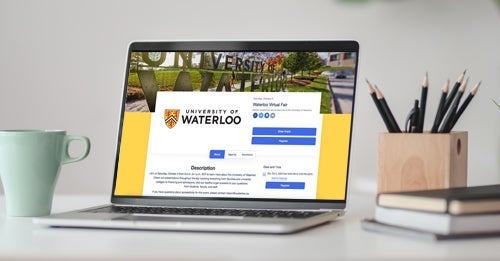Editor:
Brandon Sweet
University Communications
bulletin@uwaterloo.ca
Inaugural virtual fair draws thousands of future Warriors

A message from Marketing and Undergraduate Recruitment (MUR).
The first-ever Waterloo Virtual Fair, hosted by Marketing and Undergraduate Recruitment was held on Saturday, October 3.
Presented as a Waterloo-specific alternative to the Ontario Universities’ Fair, which was cancelled this year, the event included a welcome from the president, virtual booths for all areas of campus that support recruitment; dozens of presentations; and the opportunity to chat directly with hundreds of our amazing students, faculty, and staff. Over 7,800 individuals registered for the event and 4,600 individuals attended the live event.
If there’s a high school student in your life who’d like to know more about one of our 100+ programs, please encourage them to register for a Waterloo Wednesday webinar or the Waterloo Virtual Open House, taking place on November 7.
Showcase will feature board games with designs on racial equity

This article was originally published on Waterloo Stories.
On Wednesday, October 21, the Research, Equity, Diversity and Inclusion (REDI) Council, the Games Institute and the Council for Responsible Innovation and Technology (CRIT) are launching the University of Waterloo’s first Racial Equity Board Game Showcase, under the guidance of University of Waterloo’s Office of Research and with consultation from the Equity Office.
“Games can be a powerful and popular tool for critically challenging ideas, affording intentional, rhetorical choices that provoke, teach, recuperate and connect people and ideas in interactive ways unique to that medium,” Jason Lajoie says, CRIT Research Associate. “This showcase offers an opportunity for students, staff, faculty and researchers from every background to design contributions to anti-racism work”.
Existing games like Freedom, the Underground Railroad (2012) and Rise Up: The Game of People and Power (2017) are board game examples that help audiences understand complex issues related to race, racism and anti-racism in society.
“Through this Anti-racism Board Game Showcase event, the [REDI] Council hopes to foster research into designing games for social justice,” says Anita Layton, chair of the REDI Council. “Lighthearted scenarios in games featuring ghosts, monsters, vampires and animals can attract almost everyone to engage with serious social issues such as racial equity. The collaborative aspect of board games is particularly valuable because families and friends sit together, talk, argue and have fun. This process can encourage more serious discussions about racial equity and inclusion.”
The event, which starts from Fall Term 2020 through Spring Term 2021, will provide a platform for existing and would-be board game designers to distribute their work showcasing anti-racism themes.
The showcase kicks-off with a panel event October 21, with games and race studies researchers like Kishonna Gray, Lai-Tze Fan and Aynur Kadir. The panel will raise awareness for the showcase and allow interested participants to learn about the possibilities, expectations and issues surrounding the design of anti-racist board games.
“Submissions for the showcase will open this upcoming winter and will be evaluated based on criteria set by a group of game studies and anti-racism scholars,” notes Neil Randall, executive director of the Games Institute. “REDI, the Games Institute, and CRIT have also compiled a non-comprehensive list of resources for anyone interested in doing self-guided research on how games can promote equity, diversity and inclusivity, to be introduced at the panel. This showcase supports UWaterloo’s ongoing work to address systemic racism in all its forms on campus, and to ensure this work is led by members of BIPOC communities.”
Q and A with the experts: trusting public figures during COVID-19

The University of Waterloo has a number of experts available for comment on various aspects of the COVID-19 pandemic.
The COVID-19 pandemic has illustrated more clearly than ever that there is a large and growing divide between people who trust public figures, and people who don’t.
Waterloo English professors Ashley Rose Mehlenbacher and Brad Mehlenbacher, experts in rhetorical studies, offer us insights into how leaders can more effectively communicate complex scientific and technical information and help people trust them and the information they are providing.
What makes a public figure trustworthy?
A. Mehlenbacher: Trust is a massively complex subject, but it provides a way into the problem and some variables to assess. First, considerable evidence suggests that the public trusts scientists, although we know someone’s field can influence how much they are trusted (climate scientists, for example, are less trusted). Other public figures, such as government representatives, may be less trusted. When scientists take on a role as an advisor to a governmental official or office, the public may have a different level of trust for that person than in their capacity as a research scientist.
Trust is contextual.
Why do some people believe scientific evidence about COVID and others don't?
B. Mehlenbacher: Canadians, according to recent surveys, trust doctors and scientists (PEW Research Center has some interesting data on how much they trust them). However, disbelief in science may not be about the science itself. For example, issues around COVID-19 have become increasingly politicized. There are likely actors spreading misinformation and fueling partisan divisions on this issue for various reasons. We might be better off reframing the question to ask where people are getting dubious information from and what we can do about that.
In other cases, someone might legitimately not trust doctors because of their experiences (racism, anti-Indigenous racism, and gender bias are all examples). The question, then, is really where the basis for disbelief or, perhaps, distrust lies. The scientific evidence might not persuade someone because that person doesn’t actually have strong feelings about the evidence itself. Rather, it might be someone does not trust the institution or person representing the institution.
Is there anything public figures can do to encourage people to believe the scientific evidence they consume?
A. Mehlenbacher: What we can see is that figures who have successfully balanced their role as scientist and public health official have a lot of what we rhetoricians might call credibility, but we mean something technical by that. When we talk about credibility, we’re talking about the ability to craft a credible persona, and that includes demonstrating to your audience that you have good will toward them, that you have the kind of virtues they believe are important (in scientists we might say they’re honest, for instance), and that you have the kind of practical wisdom to understand the complexities of a particular situation and to respond to the particulars of that situation. That last feature of a credible speaker is important. Consider the criticisms that might be levied against a public health official who hasn’t considered how families will be impacted, how our collective mental health is suffering, how economies will be damaged, and so on.
Credible public health officials—Dr. Bonnie Henry is one example—have shown repeatedly that they understand these complexities, can articulate them, and consider them when making decisions such as shutting down.
Ashley Rose Mehlenbacher is an associate professor specializing in rhetorical theory and science communication at the University of Waterloo and is the Principal Investigator of the Demos Lab (Democratization through Education in Medicine, technolOgy, and Science Lab). Brad Mehlenbacher is an associate professor whose research focuses on instruction and learning with technology continues to be informed by the multidisciplinary relationship between rhetorical theory, the learning sciences, communication design, educational technologies, and human-computer interaction.
Wednesday's notes
First, a correction to yesterday's Reading Week hours for Food Services locations. In addition to The Market at UWP, the following Food Services operations are indeed operating this week:
- Starbucks STC: Open 8:00 a.m. to 3:00 p.m.
- Tim Hortons SLC: Open 8:30 a.m. to 4:30 p.m.
- Catering Eats and UC Eats (through the app) 11:00 a.m. to 6:30 p.m.
Here's what is happening at the Centre for Career Action (CCA) this week:
- Wednesday, October 21:
- Co-op 101 for 2A Planners, 2:30 p.m. to 3:30 p.m.
- Résumé Tips: Thinking Like an Employer, 4:00 p.m. to 5:30 p.m.
See CCA’s offering of virtual programming online. Students can register on WaterlooWorks.
CCA virtual drop-in advising hours for October:
- Résumé, cover letter, and interview drop-ins for UG and Masters students are offered:
- 9:00 a.m. - 10:00 a.m. and 12:00 p.m. to 1:00 p.m., Monday to Friday as well as 5:00 p.m. to 7:00 p.m., Monday to Thursday.
- Career Consult and work search drop-ins for UG and Masters students are offered,
- 9:00 a.m. to 10:00 a.m. and 12:00 to 1:00 p.m., Monday to Friday
- Further Education drop-ins are offered 1:30 p.m. to 3:30 p.m. EST Monday to Friday; and
- PhD and Postdoc drop-ins are offered 12:00 to 1:00 p.m. EST, Monday to Friday.
Students can book all virtual drop-ins through WaterlooWorks. Online registration begins at 8:00 a.m. daily.
The next meeting of the University's Senate will be held on Monday, October 19 via Microsoft Teams videoconference. Guests are welcome to join the open session of the meeting similar to a normal "in-person" Senate meeting. If you would like to attend the meeting as a guest observer, please contact Emily Schroeder to request to join the meeting. All requests must be received by Friday, October 16 at 12:00 noon. The agenda is posted on the Senate website. More information is available on the Secretariat's website.
Link of the day
When and Where to get support
Students can visit the Student Success Office online for supports including academic development, international student resources, leadership development, exchange and study abroad, and opportunities to get involved.
Instructors can visit the Keep Learning website to get support on adapting their teaching and learning plans for an online environment. The following workshops are current offerings from the KL team (CTE, CEL, ITMS, LIB):
Getting Ready to Facilitate Online Courses: TA Training, beginning Tuesday, October 13.
Remote Course Design Essentials, beginning August 26.
Independent Remote Course Design Essentials. Self-directed, continuous self-enrollment course in LEARN.
Getting Ready to Facilitate Online Courses: TA Training, Tuesday, October 13 to November 10.
Thirty Minute Thursdays – PebblePad, Thursday, October 15, 12:00 noon to 12:30 p.m.
Supporting Student Mental Health (for Instructors): self-directed, continuous self-enrollment course in LEARN.
Employees can access resources to help them work remotely, including managing University records and privacy of personal information.
Interested in learning more about engaging your students in an online course? The Centre for Extended Learning has created a new resource for you called "Fostering Engagement: Facilitating Online Courses in Higher Education"
ThisOpen Educational Resource was designed for post-secondary instructors and teaching assistants who would like to better understand the critical role of facilitation in online course delivery, and build practical skills and strategies that are relevant, effective, and authentic.
Here are some tips for staying healthy while working from home.
The Writing and Communication Centre is rolling out virtual services and programs for fall term:
- Undergrad students -- work with us to brainstorm, draft, revise, and polish assignments by meeting with our writing advisors in virtual appointments. Chat with our friendly and knowledgeable peer tutors in our virtual drop-ins and PJ-friendly writing groups. Or experience an online workshop at your own pace.
- First-year Warriors! Check out Waterloo Ready to Write to build your skills for writing success.
- Graduate Students -- meet with an advisor in a virtual appointments, take an online workshop, join the grad writing community at our Virtual Writing Cafés and #WaterlooWrites groups, develop your academic voice at Speak Like a Scholar, or make progress on your thesis at Dissertation Boot Camp.
- Instructors and faculty -- Request and access WCC workshops for use in your courses, join a virtual writing group, or speak with a writing advisor about a writing project.
We understand that these circumstances can be troubling, and you may need to speak with someone for emotional support. Good2Talk is a post-secondary student helpline based in Ontario, Canada that is available to all students. If you feel overwhelmed or anxious and need to talk to somebody, please contact the University’s Campus Wellness services, either Health Services or Counselling Services. You can also contact the University's Centre for Mental Health Research and Treatment.
The Library has published a resource guide on how to avoid information overload.
The Faculty Association of the University of Waterloo (FAUW) continues to advocate for its members. Check out the FAUW blog for more information.
The University of Waterloo Staff Association (UWSA) continues to advocate for its members. Check out the UWSA blog for more information.
WUSA supports for students:
Food Support Service food hampers are currently available from the Turnkey Desk on weekdays from 9:00 a.m. to 4:00 p.m. in the Student Life Centre. If you have any questions please email us at foodsupport@wusa.ca.
The Bike Centre – Now open by appointment for your bicycle repair and rental needs in the Student Life Centre. For more information or to schedule an appointment, please go to: https://wusa.ca/bikecentre
Centre for Academic Policy Support - CAPS is here to assist Waterloo undergraduates throughout their experience in navigating academic policy in the instances of filing petitions, grievances and appeals. Please contact them at caps@wusa.ca. More information at http://wusa.ca/caps
WUSA Commissioners who can help in a variety of areas that students may be experiencing during this time:
- Equity – equity@wusa.ca
- Co-op and Experiential Affairs – coop.affairs@wusa.ca
WUSA Student Legal Protection Program- Seeking legal counsel can be intimidating, especially if it’s your first time facing a legal issue. The legal assistance helpline provides quick access to legal advice in any area of law, including criminal. Just call 1-833-202-4571.
Empower Me is a confidential mental health and wellness service that connects students with qualified counsellors 24/7. They can be reached at 1-833-628-5589.
When and Where (but mostly when)
Healthy Warriors at Home. Free programming including Online Fitness, Health Webinars, Personalized Nutrition and more from Warriors Athletics and Rec. Open to students, staff, faculty and alumni. Register today.
Renison English Language Institute continues to offer virtual events and workshops to help students practice their English language skills.
Fall Reading Week, Saturday, October 10 to Sunday, October 18.
Grammar Studio III: Clarity at the Sentence Level Live Q&A, Tuesday, October 13, 9:00 a.m.
Dissertation Boot Camp, Tuesday, October 13 to Friday, October 16.
Anti-Racism Workshop: Understanding Racism & Racial Microaggressions within the University Context, hosted by the Equity Office and facilitated by Dr. Gauthamie Poolokasingham, Wednesday, October 14, 1:00 p.m to 4:00 p.m.
Portage-Global Water Futures Research Data Management webinar series: “5 Reasons Why You Should Know the CaSPAr and CUIZINART,” Wednesday, October 14, 1:00 p.m. Registration details are available here.
Concept Intro Session: Customer Discovery, Wednesday October 14, 5:00 p.m., Virtual Event.
First Virtual Research Colloquium: Call For Papers/Abstract Deadline Extension. Graduate students are invited to submit papers/abstracts for a chance to be awarded up to $500. New deadline for submissions is Thursday, October 15. Hosted by the University of Strathclyde and the University of Waterloo.
WaterTalk: Riverscapes and Lifeways - Biocultural Diversity and River Flow Management, Thursday, October 15, 10:00 a.m. to 11:00 a.m.
Anti-Blackness at the Intersections Workshop, hosted by the Equity Office and facilitated by Rania El Mugammar, Thursday, October 15, 1:00 p.m. to 3:00 p.m.
Supporters of Survivors Workshop, with Sexual Assault Support Centre of Waterloo Region, Thursday, October 15, 7:00 p.m. to 9:00 p.m.
Graduate Studies Endowment Fund project application deadline, Friday, October 16. Email gsef@uwaterloo.ca if you have any questions.
Giving Bad News Workshop, hosted by the Conflict Management & Human Rights Office, facilitated by Joseph Pazzano, Friday, October 16, 10:00 a.m. to 12 noon.
Positions available
On this week's list from the human resources department, viewable on the UWaterloo Talent Acquisition System (iCIMS):
- Job ID# 2020-5807 - Learning Management System / Quality Assurance Specialist - Centre for Extended Learning, USG 7 - 8
- Job ID# 2020-5826 - Learning Management System / Quality Assurance Specialist - Centre for Extended Learning, USG 7 - 8
- Job ID# 2020-5693 - Senior Development Officer and Head, Communications - Library, USG 11
Internal secondment opportunities
- Job ID# 2020-5828 - COMPASS Research Coordinator - School of Public Health and Health Systems (SPHHS), USG 6
- Job ID# 2020-5513 - Program Manager - Centre for Extended Learning, USG 10 - 11